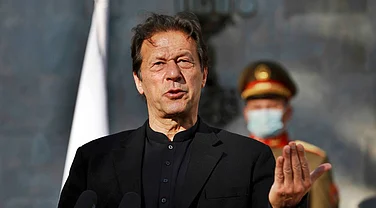After days of delay, the first tranche of humanitarian aid on Saturday entered Gaza Strip from Egypt through the Rafah border crossing on the Egypt-Gaza border.
Initial reports said 20 trucks carrying aid crossed into Gaza. For days, trucks were lined at the Rafah crossing as the modalities of the delivery of the aid were not yet finalised despite an agreement to allow aid through the crossing.
In a first since the beginning of the ongoing Israel-Hamas War, Hamas on Friday released two hostages that it had abducted during the October 7 attack on Israel.
The two released hostages, a mother and a daughter, are dual US-Israeli nationals. There are still at least 200 hostages with Hamas and aligned Palestinian groups in Gaza and they have emerged as one of the central factors in the delay in Israel's anticipated ground offensive in Gaza.
Days after US President Joe Biden advised Israel to not occupy Gaza, Israeli Defence Minister Yoav Gallant on Friday said that Israel has no intention of controlling or being responsible for life in Gaza once the ongoing war is over.
In a separate but war-related development, Israel on Friday ordered the evacuation of the town of Kiryat Shmona in northern Israel which is under constant attacks from Lebanon-based Hezbollah, which has opened a second front against Israel in the north as Hamas targets it in central and southern regions.
Humanitarian aid enters Gaza Strip from Rafah crossing
Days after the United States, Israel, Egypt, and other countries came to an agreement to deliver humanitarian aid to Gaza Strip, the first tranche of relief supplies on Saturday entered Gaza from Egypt through the Rafah crossing on the Egypt-Gaza border.
For days, trucks were lined at the Rafah crossing as the final modalities for the delivery of the aid were not yet complete despite the international agreement.
Twenty trucks full of aid entered Gaza from the Rafah crossing and the gates were soon closed after the trucks entered Gaza, reported CNN.
The exact number of trucks entering Gaza was not immediately clear as there are conflicting reports.
"More than 200 trucks carrying roughly 3,000 tons of aid, which had been positioned near the crossing for days, began heading into Gaza. Egyptian state television shows several trucks entering the gate," reported The Times of Israel.
While the delivery of aid is a welcome step, 20 trucks of relief supplies are of little help and stakeholders have said that the supply needs to be ramped up and needs to be constant. The World Health Organization (WHO) has said that it looks forward to seeing 100 trucks enter Gaza every day.
Hundreds of thousands are displaced in Gaza and stocks of food, water, and fuel are running low. Palestinians have also taken a heavy toll as a large number of civilian casualties have taken place in the Israeli bombing campaign against Hamas targets. Latest figures from Hamas-run authorities in the region show that at least 4,100 have been killed in Israeli strikes in Gaza and more than 13,000 have been injured, including several hundreds of children.
Hamas releases 2 US-Israeli nationals held as hostages
Hamas on Friday released two hostages who were held in Gaza Strip. They have been named as Judith Tai Raanan and her 17-year-old daughter Natalie Raanan.
Judith and Natalie, dual US-Israeli nationals, were abducted by Hamas on October 7 when they were visiting their relatives in southern Israel. They were abducted form the kibbutz of Nahal Oz, where at least 12 were killed by Hamas attackers and 20 people remain missing.
On October 7, Hamas mounted an all-out offensive on Israel and killed at least 1,400, injured over 4,600, and took over 200 Israeli and foreign nationals as hostages. Experts have pointed that the risk of Hamas executing hostages, using them as human shields, or hostages coming in the crossfire are among the reasons for delay in the anticipated Israeli ground offensive into Gaza.
As per the information released by the Joe Biden administration, Hamas still holds 10 US nationals as hostages in Gaza. Moreover, at least 32 US nationals are confirmed to have been killed in the Hamas attack.
Israel says no intention to control Gaza Strip
Israeli Defence Minister Yoav Gallant on Friday said that there is no plan to take control of the Gaza Strip once the ongoing war with Hamas ends.
Israel controlled Gaza for decades before it vacated it in 2005. Then, elections followed and Hamas, a designated terrorist organisation, defeated the rival Palestinian faction Fatah and drove it out of Gaza. Since 2007, Hamas has been the ruler of Gaza and Fatah has governed the West Bank under the Palestinian Authority's (PA) administration. The Gaza and West Bank collectively form the envisioned Palestinian state's territories.
Gallant told an Israeli parliamentary committee on Friday that Israel would end its "responsibility for life in the Gaza Strip" once the war is over and has no plan to take control of the region, according to BBC News.
This means that once the war is over, Israel could leave Gaza on its own to be governed entirely by its ruler Hamas and would not consider providing water or electricity.
Moreover, Gallant outlined the three-tier approach to the Israel-Hamas War, according to BBC.
The first stage of the Israeli campaign was meant to destroy Hamas's infrastructure, followed by the second phase in which the military would launch "operations at lower intensity" to eliminate "pockets of resistance", which would be followed by the third phase that would "require the removal of Israel's responsibility for life in the Gaza Strip, and the establishment of a new security reality for the citizens of Israel", according to BBC.
Gallant's statement comes days after US President Joe Biden said that Israeli occupation of Gaza would be a "big mistake".
Even though Israel does not control Gaza and Hamas runs it, the United Nations (UN) considers the delivery of essentials like electricity and water to Gaza as the responsibility of Israel, notes BBC.
Israel evacuates town along Lebanon border
Israel on Friday ordered the evacuation of the town of Kiryat Shemona in the northern part of the country because of constant Hezbollah attacks in the region.
While Hamas has continued to launch rockets into Israel from Gaza, Hezbollah has opened a second front against Israel in the north. Earlier, as many as 28 communities were evacuated in the region. In the south, the town of Sderot was evacuated earlier as it remained under the crosshairs of Hamas.
"Meanwhile, on Friday morning, the military ordered the evacuation of Kiryat Shmona amid escalating tensions on the northern border. The town has a population of some 22,000 residents, though many have already left," reported The Times of Israel, adding that the town has around 22,000 residents and the 28 communities given evacuation orders earlier have around 27,000 residents.
The Israeli military said around 20-30 rockets were fired from Lebanon on Friday into the region.
"At least five Israeli soldiers, 13 Hezbollah terrorists and five Palestinian terrorists have been killed in the exchanges. One Israeli civilian was killed in a Hezbollah attack, and several Lebanese civilians and a journalist were also reported killed by Israeli shelling," reported ToI.
French intelligence finds Palestinian rocket struck Gaza hospital
After US and Israeli intelligence assessed that it was a rocket fired by a Palestinian group that caused the blast at the Al Ahli Hospital in Gaza City, French intelligence has also arrived at the same conclusion.
Earlier, a blast occurred at the Al Ahli Hospital in Gaza on Tuesday night that killed hundreds. The Hamas-run Gaza authorities immediately blamed the Israelis for the blast and said around 500 were killed. Later, the toll was revised to 471.
Israel rejected the claim and said it was a malfunctioning rocket of Palestinian Islamic Jihad (PIJ), a Gaza-based designated terrorist organisation, that had struck the hospital. The US intelligence assessment also came to the same conclusion that it was a Palestinian group's rocket that struck the area and the same was stated by US President Joe Biden during his visit to Israel on Wednesday.
Now, French intelligence has also arrived at the understanding that none of their intelligence pointed to an Israeli strike and "the most likely cause of the deadly explosion at Gaza City’s al-Ahli hospital was a Palestinian rocket that carried an explosive charge of about 5 kilograms (11 pounds) and possibly misfired", reported the Associated Press (AP).
The analysis was based on the assessment of the crater at the site along with the combination of classified information, satellite imagery, intelligence shared by other countries and open-source information, according to AP.
Earlier, The New York Times also reported that the US intelligence community has assessed that 100-300 were killed in the attack as against the initial claim by Hamas of around 500. It also assessed that the rocket belonged to a Palestinian group, not Hamas.
"The U.S. intelligence agencies’ assessment that Israel was not responsible for the explosion was based on videos collected by civilians, satellite imagery, missile activity tracked by infrared sensors and other data...The United States has infrared sensors, which are both satellite and aircraft based, that can determine the launch sites of a variety of rockets and missiles. That technology has proved critical to the U.S. assessment, which does not lay blame for the blast on Israel," reported NYT.


























